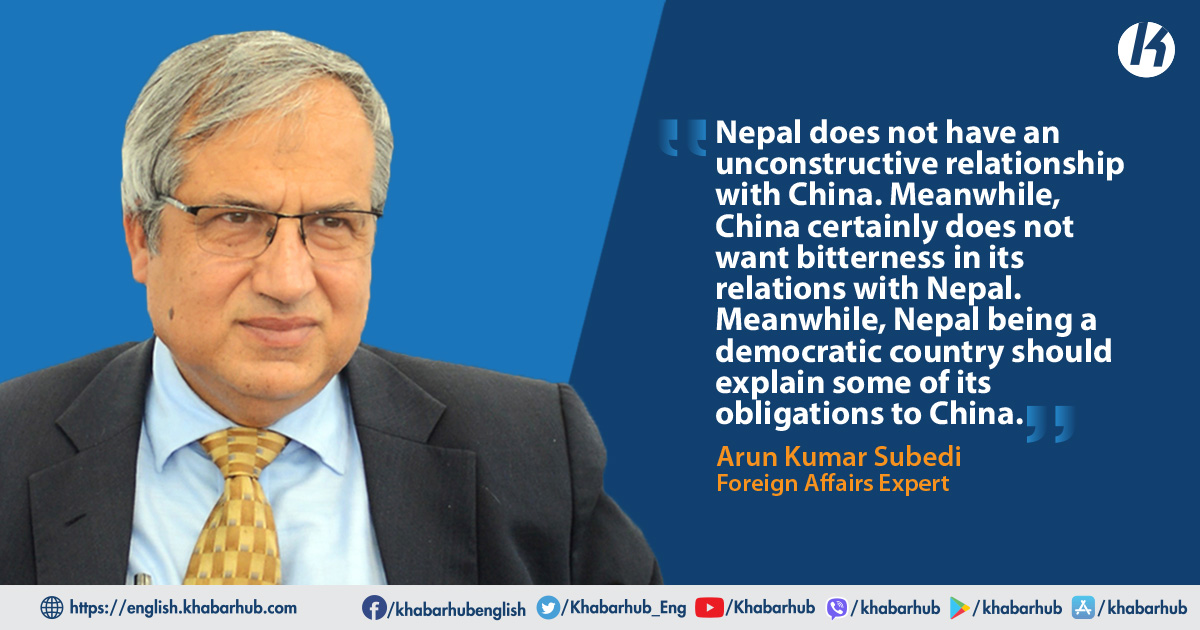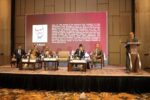State Councilor and Foreign Minister Wang Yi of China, Nepal’s northern neighbor, will pay a visit to Nepal tomorrow (March 25).
The visit of the Chinese Foreign Minister, which is taking place less than a month after the Millennium Challenge Corporation (MCC) was ratified by the Parliament of Nepal, obviously holds great significance and has an interest of high magnitude.
No clear information has been given by the Government of Nepal about the agenda of the Foreign Minister’s visit.
However, there are speculations that China could have at least five issues of concern, about which Nepal must carry out a clear and pragmatic discussion with the Chinese side.
The Chinese response to the MCC as a ‘Pandora’s box’ and the perceptions expressed by the Chinese media and intellectuals towards the ruling Nepali Congress concerning the border encroachment have gradually tarnished China’s image in Nepal.
There was a common conception that in Nepal, which is of geo-strategic and geopolitical importance, China had to do some sort of “damage control” efforts on its part.
The border situation with China is now becoming just as complicated. In the border protocol signed with King Mahendra in 1965, only the specified point was mentioned and pillar number 99 was placed in the Tinker Bhanjyang.
The United States has been providing grants to Nepal for a very long time. This is the first time that a grant has been given for physical infrastructure through MCC for providing assistance in the social and education sectors.
Now with the introduction of the GPS, and according to the agreement reached to determine the boundaries digitally, both sides have already completed the joint survey in 2007.
The same process was carried out with India, which agreed to accept the protocol in 2007 after resolving the border issue in these surveys. But, to date, China has not agreed upon.
Therefore, both governments should accept the joint survey, even if it is on the condition that it addresses the issues raised in the survey. The major problem is the number one pillar, which is clearly stated in the agreement with China based on the 1965 protocol.
However, due to the border dispute with India, Nepal is not in a position to consider Tinker Bhanjyang’s number one pillar as the last point of its border with China.
And, despite the dispute with India, Nepal is not in a position to go beyond the understanding and build a border pillar in a place where there is no joint survey west of Tinker.
In such a situation, it seems to be in the best interest of both the countries to move forward with the proposal to sign the protocol as per the joint survey completed in 2007, even though Nepal has unilaterally declared Tinker as its land.
Otherwise, many sensitive controversies like Limi, Mount Everest, Lapche may emerge in the future.
Nepal’s relationship with China should be made clear according to its national interest.
On the basis of the historical relations with China, the current world interrelationship is not a positive thing for both of China’s actions and reactions to having a negative impact on Nepal’s national interests.
Nepal has relations with India on the basis of its supply system dependence, maritime transit, economic geography and cultural geography. This is the first national interest of Nepal.
India is in a very ‘defensive’ position due to the geography of Nepal. In this situation, the occasional tension between China and India has to do with keeping our dependence and behavior in check.
In this regard, Nepal should clearly expect that China’s policy since the time of the then Chairman of the Chinese Communist Party, Mao Tse-tung, has not changed. In the current global situation, China should make it clear that Nepal should make our labor relations and diasporic and other relations a top priority.
Just as Nepal did not make its position clear during the visit of Chinese President Xi Jinping to Nepal, so too during the Foreign Minister’s visit, Nepal-China relations could enter into a state of terrible mistrust.
India, the US and China now have a crisis of confidence. Therefore, avaricious diplomacy no longer works. Case-based clarity is the need of the hour.
Nepal never wants to have a negative relationship with China. China certainly does not want bitterness in its relations with Nepal. On the contrary, we have raised concerns that Beijing is not on our side. An unnatural situation arose between Nepal and China over the MCC and the border disputes.
In particular, we have created a situation where China has to comment on the MCC with unnatural interest. Instead of saying that MCC Compact is only a matter of development and that this compact covers only the area of the economic prosperity of Nepal, two Nepali ambassadors to China, have told the Chinese side the other way round.
They said that the MCC Compact is a policy of encircling China under the Indo-Pacific Strategy, and that Nepal is under pressure.
It was natural for an uncomfortable situation to arise after the official representatives of Nepal said so.
The United States has been providing grants to Nepal for a very long time. This is the first time that a grant has been given for physical infrastructure through MCC for providing assistance in the social and education sectors.
The ambassadors from Nepal, who had to reassure the Chinese side that there was no strategic interest in it, gave a briefing that provoked China.
It was not unusual for the Chinese side to believe that the misleading remarks made by our ambassadors about the MCC were true. This is the biggest mistake we have made.
On the other hand, in Nepal too, when the leaders of the ruling coalition made similar comments in the streets for a couple of weeks, China’s negative attitude towards MCC was revealed. Due to this, China has to do ‘damage control’ in Nepal at this time.
The kind of provocative impulse about the MCC and the border caused by some Nepali politicians and so-called scholars who should be more ‘Chinese’ than China, I think Foreign Minister Wang Yi’s visit will help break the tension between Nepal and China.
The second aspect is Nepal’s China policy in the contemporary global environment. No matter who — the king, the Congress, the communists — came to the power, Nepal has not allowed any activities that have disrupted the peace and security of Tibet.
Similarly, Nepal is committed to the ‘One China Policy’. We have already acknowledged that Tibet is an integral part of China.
As Nepal is a democratic country, we have to explain some of our obligations to China. Democratic country Nepal cannot hand over refugees from Tibet. We should be able to explain our obligation to China and China should also understand it.
So far, no matter how much pressure has been exerted, China has understood the fact that Nepal cannot hand over Tibetan refugees.
As Nepal is a democratic country, not only the leaders of Nepal but also the leaders of all the nations of the world, from the United States, Russia and China, may have various slogans against us. A wide variety of news, articles and comments can come from social media. China should not take it otherwise.
Nepal’s constitution has given the freedom of expression. There are many things that can be said about Chinese President Xi Jinping tomorrow, and we can’t stop that. However, such media and network responses do not change the Government of Nepal’s policy towards China.
Just because someone has chanted slogans against a Chinese leader in the street does not mean that it is a major issue.
Not only the leaders of China but also the Prime Minister and leaders of India, which has a large cultural and economic dependence and geographical proximity to Nepal, have been the subject of various slogans, rallies and comments.
This should not be taken otherwise, and we should be able to convince China that this is obvious in a democracy so that the editor of the magazine does not have to quit his job again because of one of the cartoons. It is better to have a clear relationship with the Chinese side than to spoil it by concealing it.
During the visit of the Chinese Foreign Minister, Nepal should be able to normalize the uneasy situation in its relations with China, keeping in view its many constraints, economic and cultural dependence, natural proximity and strategic difficulties.
Now the question arises, what about the Belt and Road Initiative (BRI) between Nepal and China?
After the MCC has been approved by the parliament, a precedent has been set that if a grant or loan is taken by agreement with the government or a government-owned enterprise, it is subject to parliamentary approval. The terms and conditions of BRI also have to come under the jurisdiction of our Parliament.
Another thing is that there are some technicalities in BRI. Nepal’s geo-strategic structure is more difficult for India than for China.
India is in a very ‘defensive’ position due to the geography of Nepal. In this situation, the occasional tension between China and India has to do with keeping our dependence and behavior in check.
We get more opportunities to earn from our religious and cultural heritage from India than from China. Most of the tourists come from India.
Similarly, another source of our prosperity is water resources, whose natural markets are India and Bangladesh. Our first interest is to connect every major population center in India by rail.
The second interest is to be connected to the sea by train. We need ‘broad gauge’ trains to connect major Indian cities and the sea.
Nepal has to make it clear right now that we only want to connect Pokhara and Kathmandu with China’s ‘standard gauge’ railways. It is true that China’s ‘standard gauge’ train should be connected to Raxaul and Lumbini.
If that is done, we will have to face extraordinary pressure from India. We have greater economic and cultural dependence on India than China. It should understand the economic constraints as well as the cultural and natural similarities.
Right now we have to make it clear that we cannot get off the ‘standard gauge’ train below Kathmandu and Pokhara. We have no problem bringing the standard gauge train from Kathmandu to Lhasa.
We must also keep an eye on its economic and financial returns. While preparing the DPR, it becomes clear whether it is beneficial or not.
If it is not financially beneficial, then there is no point in accepting it. This may become clear after the study. Although economically and financially profitable, we cannot take standard gauge trains below Pokhara and Kathmandu.
And, we shouldn’t be moving in that direction. This can upset the balance of diplomatic relations and lead to unfortunate circumstances.
If we want to create a situation where standard gauge trains can be taken to Birgunj and Lumbini, let’s build a ‘dual gauge’ railway line up to our border. If one track is placed in the middle of the ‘broad gauge’, the railway of three tracks leaks.
Broad gauge and meter gauge trains are also running on the same track in Bangladesh. In Nepal too, all the ‘broad gauge’ and ‘standard gauge’ can be made.
We have to be clear about this with China. Bringing standard gauge trains to the Indian border would be a big mistake strategically.
During the visit of the Chinese Foreign Minister, Nepal should be able to normalize the uneasy situation in its relations with China, keeping in view its many constraints, economic and cultural dependence, natural proximity and strategic difficulties.
(Based on a conversation with analyst Subedi)









Comment